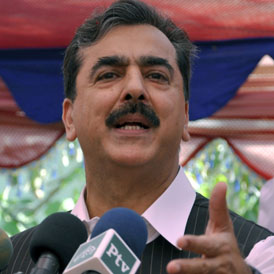Pakistani PM pours scorn on US over bin Laden op
Pakistan’s Prime Minister has delivered a trenchant attack on the US for breaching its sovereignty during the mission to kill Osama bin Laden, and called accusations of Pakistani complicity “absurd”.
Speaking in Parliament, Yusuf Raza Gilani said that the Pakistani Government was enraged by the unilateral American Navy SEALs strike on the al-Qaeda chief’s compound last Monday.
“Our people are rightly incensed on the issue of violation of sovereignty as typified by the covert US air and ground assault on Osama’s hideout in Abbottabad,” he said.

Mr Gilani also sent out a terse and thinly-veiled message to US President Barack Obama and high-ranking members of his staff, who have publicly suggested Pakistan’s intelligence service (ISI) of collusion in hiding bin Laden.
“Let’s not rush to judgement,” he said. “Allegations of complicity or incompetence are absurd. We emphatically reject such accusations: speculative narratives in the public domain meant to create despondency. We will not allow detractors to succeed in offloading their own shortcomings and errors…in a blame game that stigmatises Pakistan.”
Channel 4 News Special Reports: Osama bin Laden
Although Mr Gilani was adamant that the blame for not being aware that bin Laden was living in “scenic” Abbottabad did not lie with Pakistan, he conceded that there has been an international failing.
He said: “There has been an intelligence failure. Not only ours but of all international services in the world.”
And while repeatedly insisting that Pakistan had no knowledge whatsoever of bin Laden’s location, Mr Gilani admitted that he did not know how bin Laden had come to live in an affluent area of the country undetected.
“We will not allow detractors to succeed in offloading their own shortcomings and errors…in a blame game that stigmatises Pakistan.” Yusuf Gilani
“The obvious question…is how could Osama bin Laden hide in plain sight in Abbottabad,” he said, adding that he had ordered a full investigation into the matter.
Later in the speech, he added that while relations between Islamabad and Washington had become fraught as a result of the mission, Pakistan attached high importance to its relations with the White House.
On Sunday, President Obama said he suspected bin Laden had support within Pakistan, but the nature of that support is not yet known.
“We think that there had to be some sort of support network for Bin Laden inside of Pakistan. But we don’t know who or what that support network was,” he said.
And CIA chief Leon Panetta last week riled Pakistani leaders when he said: “The common sense would dictate that [the Pakistani authorities] had to have some idea.”
Mr Gilani’s speech came after the ISI’s former chief, Asad Munir, told Channel 4 News that although “Pakistan needs America and America needs Pakistan” in the war on terror, the relationships on the ground will never be the same again.
“You have to see that these operations are conducted by field operatives on the ground. They would feel that they have been betrayed. I don’t think these relations will be again like they were. They are the ones conducting the operations and sharing the intelligence and doing all these jobs. It will take a lot of effort to normalise relations,” he said.
Read the World News blog: Post bin-Laden, the ISI may not want to work with CIA
However, Mr Munir suggested that the ISI was in fact partly culpable for allowing bin Laden to hide in plain sight just hundreds of metres away from a military base. He explained the failing as: “Incompetence and inefficiency – nothing more…..I have no doubt in it….Nobody has ever told me ‘ok don’t catch such and such person’. I was the station chief, I (would) have been informed.”